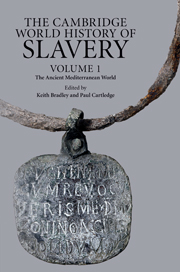Book contents
- Frontmatter
- Contents
- Series editors' introduction
- List of figures
- Acknowledgements
- Introduction
- 1 Slavery in the ancient Near East
- 2 Slaves in Greek literary culture
- 3 Classical Athens
- 4 The Helots: a contemporary review
- 5 Slavery and economy in the Greek world
- 6 The slave supply in classical Greece
- 7 Slavery and the Greek family
- 8 Resistance among chattel slaves in the classical Greek world
- 9 Archaeology and Greek slavery
- 10 Slavery in the Hellenistic world
- 11 Slavery and Roman literary culture
- 12 Slavery in the Roman Republic
- 13 Slavery Under the Principate
- 14 The Roman slave supply
- 15 Slave labour and Roman society
- 16 Slavery and the Roman family
- 17 Resisting slavery at Rome
- 18 Slavery and Roman material culture
- 19 Slavery and Roman law
- 20 Slavery and the Jews
- 21 Slavery and the rise of Christianity
- 22 Slavery in the late Roman world
- Bibliography
- General index
- Index of ancient passages cited
- Index of inscriptions and papyri
- Index of Jewish and Christian Literature Cited
Introduction
Published online by Cambridge University Press: 28 September 2011
- Frontmatter
- Contents
- Series editors' introduction
- List of figures
- Acknowledgements
- Introduction
- 1 Slavery in the ancient Near East
- 2 Slaves in Greek literary culture
- 3 Classical Athens
- 4 The Helots: a contemporary review
- 5 Slavery and economy in the Greek world
- 6 The slave supply in classical Greece
- 7 Slavery and the Greek family
- 8 Resistance among chattel slaves in the classical Greek world
- 9 Archaeology and Greek slavery
- 10 Slavery in the Hellenistic world
- 11 Slavery and Roman literary culture
- 12 Slavery in the Roman Republic
- 13 Slavery Under the Principate
- 14 The Roman slave supply
- 15 Slave labour and Roman society
- 16 Slavery and the Roman family
- 17 Resisting slavery at Rome
- 18 Slavery and Roman material culture
- 19 Slavery and Roman law
- 20 Slavery and the Jews
- 21 Slavery and the rise of Christianity
- 22 Slavery in the late Roman world
- Bibliography
- General index
- Index of ancient passages cited
- Index of inscriptions and papyri
- Index of Jewish and Christian Literature Cited
Summary
The purpose of this volume, the first in a series of multi-authored works examining the institution of slavery throughout human history, is to survey the history of slavery in the ancient Mediterranean world. It begins with an overview of slavery in the ancient Near East, then quickly moves to its principal concern, the history of slavery in the societies of ancient Greece and Rome. In these societies slaves were regularly used as primary producers in the key economic activities of agriculture, mining and manufacturing. As domestic servants and administrators, they also provided their owners with a multitude of services. In competitive social and political contexts, they were sometimes simultaneously items of conspicuous display.
The scale of ancient slave-owning varied from period to period and from place to place. In certain instances, especially in classical Athens and in Roman Italy of the Late Republic and Principate, it became particularly prominent. But despite fluctuations of scale, slavery as a concept was never altogether absent from ancient Mediterranean life. Ideologically, members of society were divided into two broad categories: those who were free and those who were not. As the Roman jurist Gaius stated, attributing the coercive authority that slave-owners exercised in the second century ad to universal standards: ‘The principal distinction in the law of persons is this, that all human beings are either free men or slaves’ (Institutes 1.9). For Greeks and Romans throughout their history, slavery was a defining and distinctive element of culture.
- Type
- Chapter
- Information
- The Cambridge World History of Slavery , pp. 1 - 3Publisher: Cambridge University PressPrint publication year: 2011

